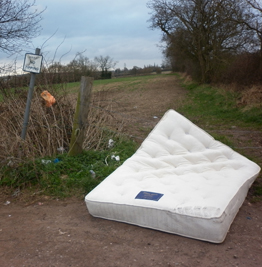The illegal dumping of waste by criminal gangs is costing in clean-up costs and insurance claims, according to the trade body the British Security Industry Association (BSIA).
Fly-tipping is a growing issue which can end up costing thousands and in some cases up to seven figures in clean up and insurance claims. The costs, which might be borne by the landlords of fly-tipping hotspots if they are not covered by insurance, can routinely reach hundreds of thousands of pounds and claims have been known to regularly exceed this figure. Companies who fail to adequately protect their assets, or have been victims of fly-tipping, could find their insurance cost rising – and they are not the only ones who pay. Some of these costs are met by taxpayers. According to the Local Government Association (LGA), the cost to taxpayers of clearing up fly-tipping rose to £57m in the past year – up 13pc on 2017.
Restrictions on the tipping of waste and the inevitable dumping to avoid paying for waste processing are key factors for this unlawful behaviour and in recent times a far larger and by far costly crime is occurring on an almost daily basis. This involves the unlawful occupation of land followed by large scale collection and disposal of waste. There have also been many cases of industrial units rented on short leases which have then been filled with illegal waste and left for the landlord to clear out the building.
The recent surge in fly-tipping is blamed on organised gangs offering cheap disposal services to businesses and then simply fly-tipping the waste to avoid the payment of landfill tax, £88.95 per tonne. More sophisticated fly-tippers have also been setting up dummy companies, which advertise cheap skip rentals, take out short term leases on warehouses then fill them from floor to ceiling with waste before moving on before the landlord realises that rent has not been paid and visits the premises to investigate.
Tony Cockcroft, Chair of the Security Guarding Section, BSIA, said: “This activity is on an enormous scale involving the tipping of hundreds of tonnes of waste. The waste is collected from building sites, garden and house clearances and this criminal activity is netting large amounts of money for those involved in the process.
“In most cases of land tipping the perpetrators are evicted from the site only to move onto another close by and repeat the same activity again and again. The police and other agencies seldom make arrests, prosecute individuals or confiscate vehicles largely due to already overstretched resources focused on serious crime and terrorist threats.”
And Gideon Reichental, Chair of the Vacant Property Protection Section, BSIA, said: “Fly-tipping is not just an unnecessarily expensive eyesore it can also be dangerous; tipped rubbish has been known to include specialist and clinical waste which can be hazardous, and mixed waste can spontaneously combust resulting in substantial fires which harm the environment through airborne pollution and contaminated fire-water run-off, which is why it has never been more important to tackle the problem head on.”
“The BSIA’s Vacant Property Protection section has had keen interest in this problem as it affects many of our clients in the public and private sector on a day to day basis and they are working closely with the Association’s lobbying team to see what additional government support or legislation can be provided to help address this issue.”
BSIA advice
Protecting large areas of land can prove difficult but there are a number of fairly simple, inexpensive measures that should be considered as it is far better, and ultimately cheaper, to deter a person from entering land rather than having to subsequently evict them and restore the site. As a minimum, the BSIA recommends the installation of strong metal gates with toughened steel padlocks and anti-lift hinges. If the site is vacant, block all vulnerable access points with concrete barriers. Secure the perimeter with strong fencing, posts, earth mounds or trenches and frequently check the site and the perimeter. The BSIA also advises landlords of industrial units to put into place robust procedures to identify if the persons looking to rent a property are fit and proper.
It is also worth contacting the police on the non-emergency number 101 if you think land is being occupied though they have only restricted powers to deal with people who breach civil law by trespassing. In certain circumstances, a direction to leave may be made and in the event of noncompliance arrests may follow. However, the powers to remove trespassers are discretionary and will not be used by the police unless considered absolutely necessary. If trespassers do not leave when requested to do so then landowners should go through the normal channels of civil recovery as quickly as possible to mitigate the potential damage and resulting costs.
(All figures quoted in this release, provided by Dougie Barnett, Head of Mid-Market and Customer Risk Management, AXA Insurance.)









